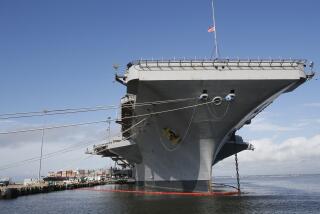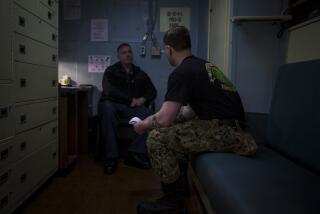Criminal Links to Iowa a Possibility, Navy Says : Service Contends Sailors’ Ruptured Friendship May Have Led to Thoughts of Murder or Suicide
- Share via
WASHINGTON — The investigation into the April 19 explosion that killed 47 sailors on the battleship Iowa has “a criminal aspect to it,” the Pentagon disclosed Thursday in confirming reports that a ruptured friendship between two members of the gun turret crew may have led one or both of them to ponder murder or suicide.
Meanwhile, the Navy announced that the surviving member of the friendship, Gunner’s Mate 3rd Class Kendall L. Truitt, 21, has been transferred off the Iowa before it was to depart on a six-month deployment June 6. Citing the “extensive publicity surrounding the Iowa explosion,” the service reassigned Truitt “in the best interests of Petty Officer Truitt, the Iowa and the Navy,” a Navy spokesman said.
Truitt was one of only 11 men in the ill-fated second gun turret to survive the blast. The other subject of the current investigation--24-year-old Gunner’s Mate 2nd Class Clayton Michael Hartwig--died in the explosion, leaving Truitt as the beneficiary of a $100,000 life insurance policy, Navy officials said.
Hartwig, as a gun captain in Turret 2, would have been one of the last men to handle the 550-pound bag of explosive powder that ignited to trigger the blast.
Kathleen Kubicina, Hartwig’s sister, told The Times from her home in Cleveland that federal and Navy investigators had questioned her and her family at length about Hartwig’s relationship with Truitt. Kubicina, who is contesting Truitt’s claim to the insurance money, was among the first to alert naval investigators to the insurance policy, Navy officials said.
Asked whether she believes that either Hartwig or Truitt had engineered the fatal blast, Kubicina said: “I absolutely do not believe that.”
In the wake of widespread reports that investigators found explosive devices among the possessions of Truitt and Hartwig, officials said that the inquiry has proved inconclusive so far.
“We have no evidence to prove homicide or suicide here,” said Deborah Johnson, an agent with the Naval Investigative Service in Norfolk, Va., where the Iowa is based. She described theories of homicide or suicide as “possibilities among many possibilities.”
But investigators so far have failed to find any evidence to suggest that the crew of Turret 2 accidentally misloaded the gun or mishandled the explosive powder that powers projectiles to distances of 23 miles. In the absence of other strong clues to the cause of the explosion, the inquiry increasingly has focused on the Hartwig-Truitt connection.
“There’s nothing else,” said a knowledgeable Navy source. “There’s a lot of confusion” among investigators, the source added.
Knowledgeable sources said that Navy criminal investigators on the West Coast were questioning Truitt’s friends about his relationship with Hartwig, including the possibility that one or both men were homosexual. The investigators also sought information from Truitt’s former crew mates now based in San Diego about the insurance policy that Hartwig purchased and what Truitt knew about it.
Gay rights groups protested the Navy’s focus on the relationship between Hartwig and Truitt.
“It’s not surprising that the Navy would blame the Iowa disaster on personal emotions rather than on military negligence, particularly when they could also then claim support for their ridiculous argument that gays are unfit for military service,” said Craig Davidson, executive director of the New York-based Gay and Lesbian Alliance Against Defamation.
Staff writer Carla Lazzareschi contributed to this story from Los Angeles.
More to Read
Sign up for Essential California
The most important California stories and recommendations in your inbox every morning.
You may occasionally receive promotional content from the Los Angeles Times.














